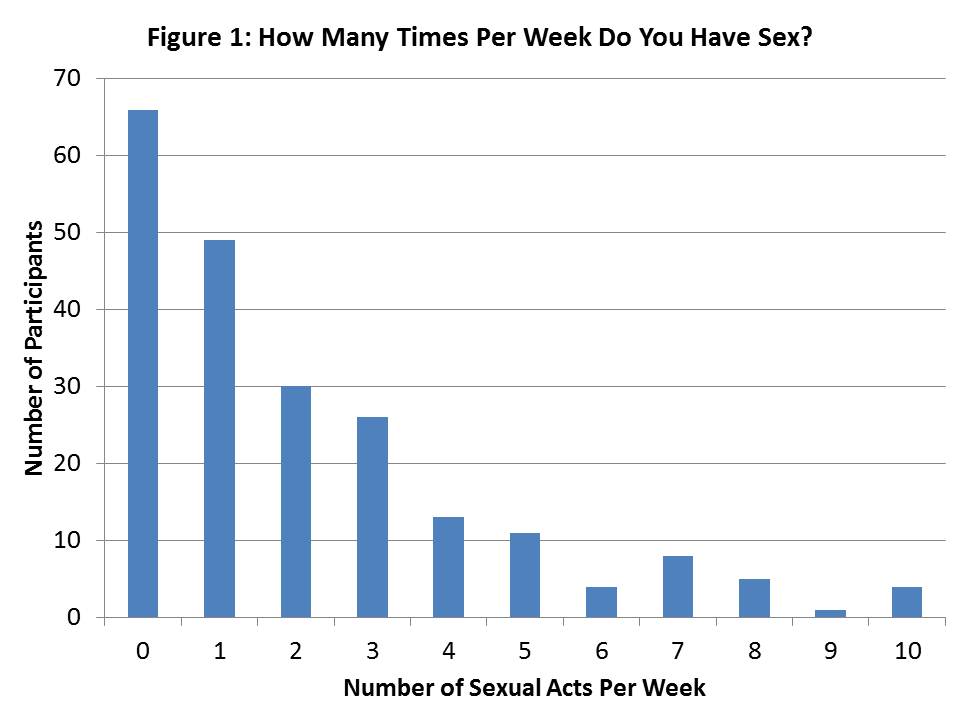Do People Who Watch More Porn Have A Worse Sex Life?
February 15, 2013 by Justin Lehmiller
Results of The Psychology of Human Sexuality’s first Reader Survey are in! Today, I will present the first round of results, focusing specifically on the associations between amount of Internet pornography viewed, frequency of sexual activity, and sexual satisfaction. We will also address the question of how many times per week readers of this site have sex.
Let me start by telling you a little about the sample. A total of 217 individuals (54% female-identified, 45% male-identified, 1% transgendered) ages 18-70 from 23 different countries participated. Most participants identified as heterosexual (72%). However, there was significant variability in sexual identity, with 14% indicating they were bisexual, 7% gay/lesbian, 4% pansexual, 1% asexual, and 2% selecting someting else. This confirms something I’ve been arguing for a long time about how researchers measure sexual orientation: it is insufficient to simply measure sexuality with the traditional 3-item measure of heterosexual, homosexual, and bisexual—you may be missing a lot of important information by doing that.
Now for the dirty details. How often were people having sex? Participants reported getting it on an average of 2.1 times per week. However, there was substantial variability, as you can see in Figure 1 below. Nearly one-third of the participants reported not having any sex at all during an average week.

Overall participants reported being sexually satisfied on balance (the average level of satisfaction was 4.65 on a scale ranging from 1 to 7); however, satisfaction was strongly correlated with frequency of sexual activity (r = .57, p <.001), which tells us that the people who had sex most often were the most satisfied. This is not particularly surprising and is consistent with published research [1].
Participants were also asked how frequently they viewed Internet pornography. On average, participants reported watching it 3.2 times per week (with a range of 0 to 28). However, men watched is significantly more than women (4.8 times vs. 1.9 times, respectively; t(209)=5.78, p<.001), consistent with other research [2]. Interestingly, despite frequent claims that exposure to online pornography is linked to sexual problems, there was no correlation between amount of pornography exposure and sexual satisfaction (r = -.062, p =.369). Porn watching was not related to frequency of sexual activity either (r = -.011, p =.871). Thus, at least in this sample, a high frequency of pornography exposure was not linked to lower quantity or quality of sex.
Of course, given the non-representative nature of this sample, we must be very cautious in attempting to generalize the findings. The results should also not be taken to mean that pornography exposure is perfectly healthy for everyone. For example, among persons who use online porn compulsively and are accessing hundreds of videos and images per day, such activity may be supplanting their sex life and creating relationship problems.
Stay tuned for the next round of results, where we will look at your experiences with secret relationships and friends with benefits!
Want to learn more about Sex and Psychology? Click here for more from the blog or here to listen to the podcast. Follow Sex and Psychology on Facebook, Twitter (@JustinLehmiller), or Reddit to receive updates. You can also follow Dr. Lehmiller on YouTube and Instagram.
[1] Young, M., Denny, G., Luquis, R., & Young, T. (1998). Correlates of sexual satisfaction in marriage. Canadian Journal of Human Sexuality, 7, 115-127.
[2] Stack, S., Wasserman, I., & Kern, R. (2004). Adult social bonds and use of internet pornography. Social Science Quarterly, 85, 75-88.
Image Source: 123rf
You Might Also Like:

Dr. Justin Lehmiller
Founder & Owner of Sex and PsychologyDr. Justin Lehmiller is a social psychologist and Research Fellow at The Kinsey Institute. He runs the Sex and Psychology blog and podcast and is author of the popular book Tell Me What You Want. Dr. Lehmiller is an award-winning educator, and a prolific researcher who has published more than 50 academic works.
Read full bio >


